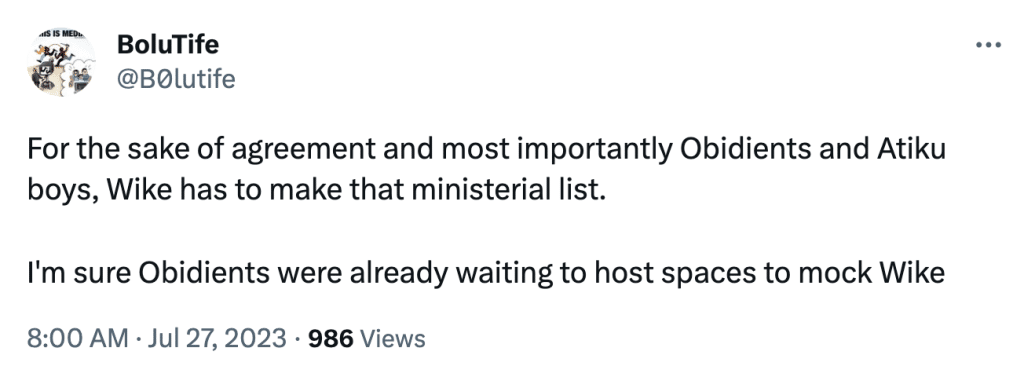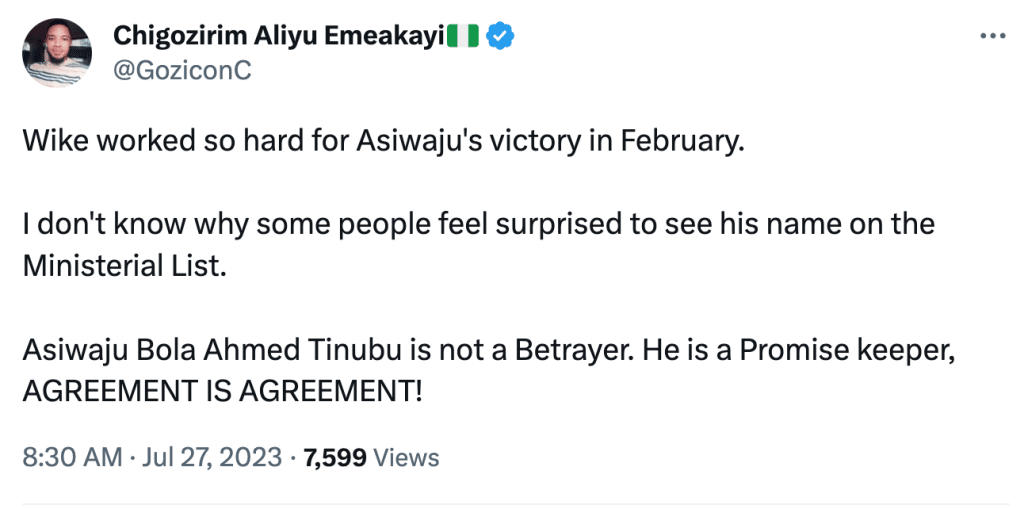After playing the ostrich for so many years, it has now become apparent that state police is inevitable. The call by Lagos State speaker, Mudashiru Obasa during the House of Assembly’s first plenary on July 11, on lawmakers of the Senate and the House of Representatives to “begin an amendment of the constitution to contain the creation of the alternative policing” should therefore only serve as a sad reminder of our past folly.
For close to 50 years, the south and other well informed Nigerians have called for the establishment of state police on the premise that ‘local problems require local solutions’. The hegemonic powers who wish to preside over an empire of slaves rejected such a call because of selfish political considerations.
More tragic, our military, a creation of the colonial powers, share the same mind-set with their creator and role model. Subsequently, when our military leaders including Obasanjo through Babangida and Buhari, men who were never trained to manage the affairs of society, fortuitously found themselves in power, they, like the departed occupying powers, arrogantly equated their periodic brain-wave to a viable policy alternative for a conquered territory.
First was the delusion that 36 federating states and 774 LGAs created and funded from Abuja without objective criteria was best for a multicultural, multi-ethnic and heterogeneous society where groups were at different levels of cultural development. Their own selfish desire to maintain a strangle-hold on the people aligned with the northern leaders’ opposition to state police that could threaten their monopoly of power through control of law and order over their empire of slaves.
The revolt of the poor, uneducated and marginalized who have no say in how they were being governed bred terrorists, jihadists, bandits, kidnappers and armed herdsmen, that took refuge inside North’s huge ungoverned forests from where they visited violence on the people.
Nigerians had looked up to President Buhari, the man they massively voted into power because of his pan-Nigeria outlook, to end their nightmare. Buhari and his ‘loyal gatekeepers’ ignored the cry of Northern Elders Forum, the July 2021demand by northeast governors of Adamawa, Taraba, Bauchi, Gombe, Yobe and Borno for state and community police just as they did to that of September 2022, northern governors and northern traditional rulers councils’ call for the establishment of state police to tackle security challenges in their region.
But while anarchy reigned supreme in the north, President Buhari’s “loyal gate keepers” appeared to be more interested in replicating the northern tragedy in the south. Or what other explanation can one give for relentless war waged by Shehu Garba (Buhari’s senior media adviser and Abubakar Malami (his Minister of Justice) against Governor Rotimi Akeredolu’s efforts to eject killer herdsmen illegally occupying reserved forests in his state, and Southwest Governors Forum’s efforts to set up Amotekun local security outfit to tackle kidnappings and killings by those believed to be invading immigrant herdsmen?
Buhari and his men continued to dig deeper into the hole even as his federal government which the northern hegemonic power depended on to maintain law and order was unable to perform. In the face of an impending anarchy, his vice president, Yemi Osinbajo admitted to their government’s heroic failure to end the nation’s nightmare. While admitting “Every Nigerian, is entitled to adequate security from the government for their livelihoods”, he confessed that their “Government fails in that responsibility” because “For a country of our size to meet the ‘one policeman to 400 persons’ prescribed by the United Nations would require triple our current police force; far more funding of the police force and far more funding of our military and other security agencies.”
But betrayed by Buhari’s government of hope, the nation continued to pay huge price for the folly of self-serving political leaders who insisted on imposing their world-view no matter how depraved and irrational on how Nigeria is governed despite admonitions and warnings by other Nigerian stakeholders.
For instance The Punch in an editorial had raised an alarm that “With 371,000 officers, the Nigeria Police Force are overwhelmed, and many parts of the country lack any permanent police presence. Insurgents of different stripes taking advantage of this have seized control of some hinterland territories, imposing brutal, bloody rule over the locals”. (Punch July 21)
Vanguard newspapers on its part has also argued that “federal-controlled police force in a diverse, complicated federation with an exploding population of over 200 million people, policed by 371,800 personnel, with up to a third of them attached to VIPs”, is not only injurious to the health of the nation, maintaining the military command structure in our federal system is undemocratic, anti-people and does not promote good and accountable governance.”
Our leaders continued to play the ostrich even with the periodic harvest of deaths in the north-central states of Benue, Plateau and southern Zaria where armed immigrant herdsmen in aid of settlers who lust over their host’s land, had embarked on inter-communal killings of poor subsistence farmers whose land is confiscated with survivors reduced to inmates of IDP camps. Peace has continued to elude the northeast and Buhari’s northwest region after his eight years of heroic failure. And of course the southeast remains restive with the ongoing intra-communal bestial and brutish killings which the perpetrators blame on federal government and its agents.
Now that we have seen the folly in the continuing objection to the establishment of state police, there can be no better period to allow the people take control over their own security through state and community policing than now.
It is a relief that we have a new sheriff in town that is answerable to neither ethnic, religious group, nor godfathers and owners of Nigeria. He has promised embark on what he believes to be best for our country. No one, including the leading lights of his party can therefore hold him to ransom or derail this noble endeavour
And it was just as well that it was his immediate constituency, Lagos State that reminded him two weeks back that his success or failure will be determined not by building roads and bridges like his predecessor or turning the economic fortune of the nation around but by his efforts at liberating individuals and groups from the tyranny of the state through devolution of powers.
People want to take control of their own security, decide education and the moral values to be imbibed by their children in addition to the water they drink, the air they breathe and the God or gods they worship without interference from dysfunctional Abuja. And since we operate a federal system, what federalism sets out to achieve is individual and group rights which can be defined in form of language, culture, and religion or socio economic status.
The president is not being asked to invent the wheel. He can easily borrow from the experiences of India, a more heterogeneous and populous nation and Canada, the first federation to adopt multi-culturalism as a policy that has shown how a plural society can manage its group differences.
He must start in earnest the mobilization of National Assembly members for the constitutional amendment required to institutionalize state and community policing. This will allow each of the country’s six geo-political zones protect its territory and its citizens from armed gangs from neighbouring federating states or from the Sahel region of the north and central Africa. There is no better evidence of anarchy than when a Governor Bala Mohammed of Bauchi will without restraints, declare Fulani from any part of Africa a Nigerian.






